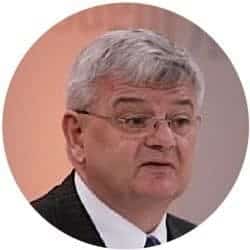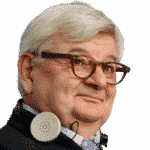
A lot can happen between now and the second round of the French presidential election on May 7, so it is still too early to celebrate. But, even with the nationalist, populist candidate Marine Le Pen still in the running, many observers are genuinely hopeful that the first-round winner, Emmanuel Macron, will be France’s next president.
With Macron’s victory, Europe would avoid self-destruction yet again. A President Le Pen would almost surely bring about the end of the European Union. Taking France out of the eurozone, as Le Pen has promised, would lead to the collapse of the euro itself. After that, the EU common market and other core institutions would fall like dominoes. Europe would plunge into the abyss, and 60 years of political, economic, and social progress would be lost.
Moreover, Le Pen wants to withdraw France from NATO and pursue friendlier relations with Vladimir Putin’s Russia. This would throw current security arrangements across Europe into chaos, quite possibly leading to panic among investors and plunging the continent into economic crisis. The political consequences are scarcely predicable.
After France’s second-round vote, Europe will likely be spared this nightmare scenario for the time being – meaning the next five years. Still, to avoid a future disaster, European leaders must learn the right lessons from this year’s French election.
For starters, it is in Europe’s interest that a President Macron not fail. The EU’s future, and particularly that of Germany, depends on a successful Macron presidency to lift France from its long economic malaise and resolve its paralyzing identity crisis.
A weak, economically stagnant, and politically insecure France poses an acute danger to the entire European project, because a France that remains in that state will inevitably succumb to the type of anti-European nationalism that Le Pen represents. At the same time, a strong, self-confident France is necessary for the EU’s long-term survival.
Whether or not Macron’s presidency is a success will depend on his ability to heal France’s social divisions, restore its economic dynamism, and tackle its high unemployment, particularly among young people. We should not lose sight of the fact that almost half of the French electorate voted for Euroskeptic and anti-establishment candidates in the first round. The EU cannot survive many more elections with that kind of outcome, so “business as usual” is no longer an option.
Above all, the next French president will have to restore economic growth. And the same can be said for all other eurozone member states. After Germany’s general election in September, the government will finally have to take the plunge and pursue a more robust economic policy, unless it wants to cede the stage to nationalists who would destroy the EU.
Although Germany has made valid arguments in defense of its fiscal and external surpluses, its current economic model has failed to stimulate enough growth in the eurozone to stabilize the single currency. Achieving that goal will require a new consensus between Northern and Southern Europe, led by Germany and France.
It will also require Germany finally to take some decisive steps toward accommodating France’s economic needs, and to dispel the illusion that the EU can survive under a regime of exclusive German leadership. The EU is a complicated entity that can be led only by a strong French-German axis working in concert with other member states. That, too, is a lasting lesson that European leaders should take from the French election.
Macron, for his part, will have to avoid a trap that ensnared his predecessors Nicolas Sarkozy and François Hollande. Both cozied up too closely to German Chancellor Angela Merkel, and thus could not confront the German government when necessary. For example, I would wager that if France had done more to challenge Germany’s opposition to Eurobonds, anti-European populists on both the left and the right would not have gained the political momentum that they have in recent years. Constructive conflict in Europe is sometimes necessary. Without it, what the EU stands for remains obscure.
As the French presidential election reaches its conclusion, the description of Europe as a “community of destiny” still holds true, even after 60 years. On May 7, France will decide not just its own fate, but that of the EU, too. Europeans should rejoice – but then they must get down to work.
Copyright: Project Syndicate 2017 The French Election and Europe’s Future
Joschka Fischer was Germany’s foreign minister and vice-chancellor from 1998 to 2005 and a leader in the German Green Party for almost 20 years.

